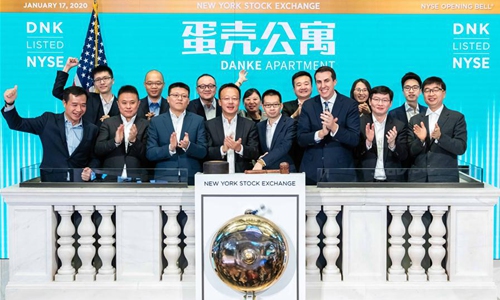
Gao Jing (4th R, Front), CEO of Danke Apartment, rings the opening bell at the New York Stock Exchange in New York, the United States, on Jan. 17, 2020. (Photo: Xinhua)
Phoenix Tree Holdings, a leading Chinese apartment rental service provider, rang the New York Stock Exchange (NYSE) opening bell on Friday in celebration of its initial public offering (IPO).
The company, trading under the ticker symbol of "DNK," announced its IPO of 9.6 million American depositary shares (ADSs), each representing 10 Class A ordinary shares of the company, at a price to the public of $13.50 per ADS.
Citi, Credit Suisse and J.P. Morgan acted as lead managers on the deal.
The stock started trading at $13.50 per share on Friday, and declined 3.56 percent from its pricing to trade at $13.02 apiece around midday.
The firm, operating under the name of Danke Apartment, was founded in 2015. The Beijing-based company, which had established operations in 13 cities across China as of Sept. 30, 2019, is one of the largest co-living platforms in the country with rapid growth, said its prospectus, citing consulting firm iResearch.
Gao Jing, CEO of Danke Apartment, told Xinhua that China's residential rental market is huge and fast-growing, providing tremendous opportunities for his startup.
Calling the company's debut on the US exchanges "a milestone," Gao also expects the move would help the company's brand building and attract more talents.
China's residential rental market is expected to grow to 3.0 trillion yuan (or about $437 billion) by 2023 from 1.8 trillion yuan in 2018, according to iResearch.
The number of Chinese firms listed on the US exchanges has increased in recent years. As of Thursday, the S&P US Listed China 50 index, which is designed to track the performance of the 50 largest Chinese companies listed on US exchanges by total market cap, stood at 3,429.36, marking an 8.28-percent gain for year-to-date returns.


